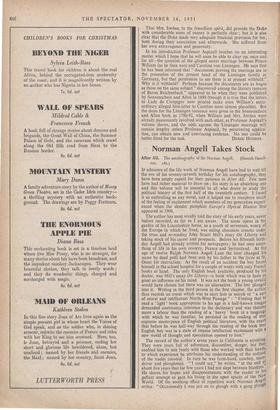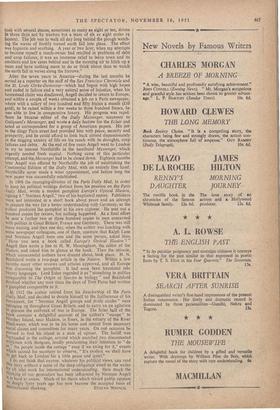, Norman Angell Takes Stock
After AlL The autobiography of Sir Norman Angell. (Hamish Hamil-
ton. 8s.) IF admirers of the life work of Norman Angell have had to watt till the eve Of his seventy-seventh birthday for his autobiography, they have been amply repaid for their patience in After All. Few men have had richer material to draw on ; his story is an absorbing one and this volume will be essential to all who desire to study the political history of the first half of the twentieth century. I found it as enthralling as any novel, and it helped me to recapture much of the feeling of excitement which members of my generation experiL: enced when the slender pamphlet Europe's Optical Illusion first appeared in 1908.
The author has most vividly told the story of his early years, never before recorded, as far as I am aware. The scene opens in the garden of his Lincolnshire home, as a youth of seventeen, weary of the Europe in which he lived, was eating chocolate creams under, the trees and re-reading John Stuart Mill's essay On Liberty and taking stock of his career and prospects. Before his fifteenth birth- day Angell had already written for newspapers ; he had seen some.' thing of life in his own country, France and Switzerland. At the age of twelve Ralph Norman Angell Lane (he later changed hi name by deed poll) had been sent by his father to the lycee at St. Omer for instruction. As the result of an accident the boy foun himself in the school hospital for a couple of weeks with only French books at hand. The only English book ayailable, produced by hi doctor, was Mill's essay On Liberty—a book which was to have sa great an influence on his mind. It was not the book a young invalid would have chosen but there was no alternative. The boy plunged into it. Writing in the third person in the first chapter, the author thus records an event which was to start him in search. of "a sort of moral and intellectual North-West Passages' : "Finding that to read a 'light' book appropriate to his age in a half-known tongue demanded continuous reference to the dictionary and was therebY more a labour than the reading of a 'heavy' book in a language with which he was familiar, he persisted in the reading of that supreme masterpiece of English political literature, with the result that before he was half-way through the reading of the book that English boy was in a state of intense intellectual excitement with a new world of thought and speculation opened to him."
The record of the author's seven years in California is arresting. They were years full of adventure, discomfort, danger, but theY enabled him to mix freely with those who worked with their hahtI9, to which experience he attributes his understanding of the outlook of the trades unionist. In turn he was farm-hand, cowboy, team: driver and ploughman. "I could say," he writes, "at the end oE, about five years that for five years I had not slept between blankets.' He shares his hopes and disappointments with the reader in his gallant attempt to gain his living in the open spaces of the World. Of the soothing effect of repetitive work Norman Ange,L1 writes: "Occasionally 1 was put on to plough with a gang plot1611
(one with several shares, sometimes as many as eight or ten, driven hi those day i not by tractors but a team of six or eight mules ot horses). The job was to walk all day long behind the plough watch- ing the waves of freshly turned earth fall into place. The effect was hypnotic and soothing. A year or two later, When my attempts to become myself a ranch-owner had resulted in problems of debt and crop failures, it was an immense relief to leave town and its creditors and law cases behind and in the morning air to hitch up a team and have nothing more to do or think about than to watch the earth fall in waves along the furrows."
After the seven years in America—during the last months he served as a reporter on the staff of the San Francisco Chronicle and the St. Louis Globe-Democrat--which had begun with high hopes and ended in failure and a very natural sense of injustice, when his homestead claim was disallowed, Angell decided to return to Europe, and within a couple of weeks obtained a job on a Paris newspaper, where with a salary of two hundred and fifty francs a month (f10 gold), to be raised within a few weeks to three hundred francs, he was able to live in comparative luxury. His progress was rapid. Soon he became editor of the Daily Messenger, successor to Galignani's Messenger, and wrote a dally feature for the Eclair and acted as correspondent for a group of American papers. His job in the dingy Paris street had provided him with peace, security and prosperity, and he could afford to look back almost dispassionately at the nagging anxiety of life on his ranch with its droughts, crop failures and debts. At the end of five years Angell went to London to try to interest Northcliffe in the moribund Messenger, which urgently needed fresh capital. Nothing came of this particular attempt, and the,Messenger had to be closed down. Eighteen months later Angell was offered by Northcliffe the job of establishing the Continental Edition of the Daily Mail, With an entirely free hand. Northcliffe never made a wiser appointment, and before long the new' paper was successfully established.
In 1908 the managing-director of the Paris Daily Mail, in order to keep his political writings distinct from his position on the Paris Daily Mail, wrote a modest pamphlet Europe's Optical illusion, igning it" Norman Angell," two of his baptismal names. Publishers were not interested in a short book about peace and an attempt to prepare the way for a better understanding with Germany, so the author produced the pamphlet at his own expense. He sent out a hundred copies for review, but nothing happened. As a final effort he sent a further two or three hundred copies to men concerned With politics in Great Britain, France and Germany. There was still more waiting, and then one day, when the author was lunching with some newspaper colleagues, one of them, unaware that Ralph Lane and Norman Angell were one and the same person, asked him; 'Have you seen a book called Europe's Optical Illusion ? " Angell then wrote a line to H. W. Massingham, the editor of the Nation, and asked him to glance at the book. Then the miracle, Which unsuccessful authors have dreamt about, took place. H. N. Brailsford wrote a two-page article in the Nation. Within a few Months many other reviews and articles appeared, and all Europe Was discussing the pamphlet. It had soon been translated into twenty languages. Lord Esher regarded it as" something in politics comparable to The Origin of Species in biology" and Brailsford doubted whether any man since the days of Tom Paine had written a pamphlet comparable to it.
in 1912 the author retired from his directorship of the Paris Daily Mail, and decided to devote himself to the furtherance of his Movement, for "Norman Angell groups and study circles" were springing up throughout Great Britain, and to carry on an agitation to,prevent the outbreak of war in Europe. The latter half of the book contains a delightful account of the author's " escape " to
_
.1.`,4orthey Island, near Maldon, in Essex, in the estuary of the River tglackwater, which was to be his home and retreat from necessary sgeial claims and committees for many years. On one occasion he rtived to find his island in a state of uproar. The bailiff was °artieaded in the cottage, around which marched two discontented I'vqr,kmen with shotguns, loudly proclaiming their intention to "do the people inside the cottage "even if we swing for it," events Wilich caused his secretary to observe, "It's evident we shall have '0 get back to London' for a little peace and quiet." , 1 00 not think that anyone, whatever his political Views, an read Lois story without a sense of the deep obligation owed to the writer „Y- all who work for international understanding. How much the ."inking of our generation has been influenced by Norman Angell 11 5, hard to assess. Much of his thesis which stirred public opinion 9. deeply forty years ago has now become the accepted basis •of















































































 Previous page
Previous page